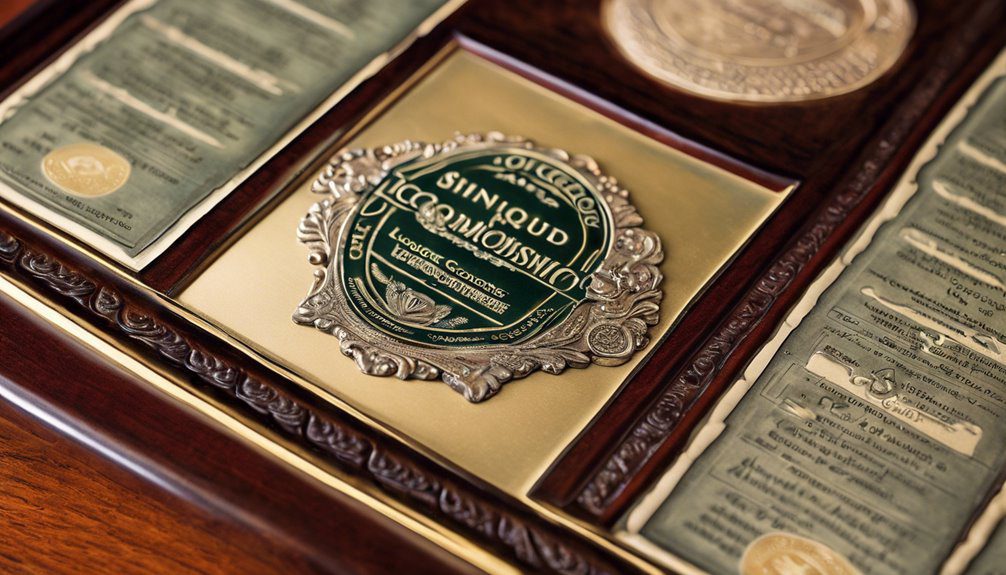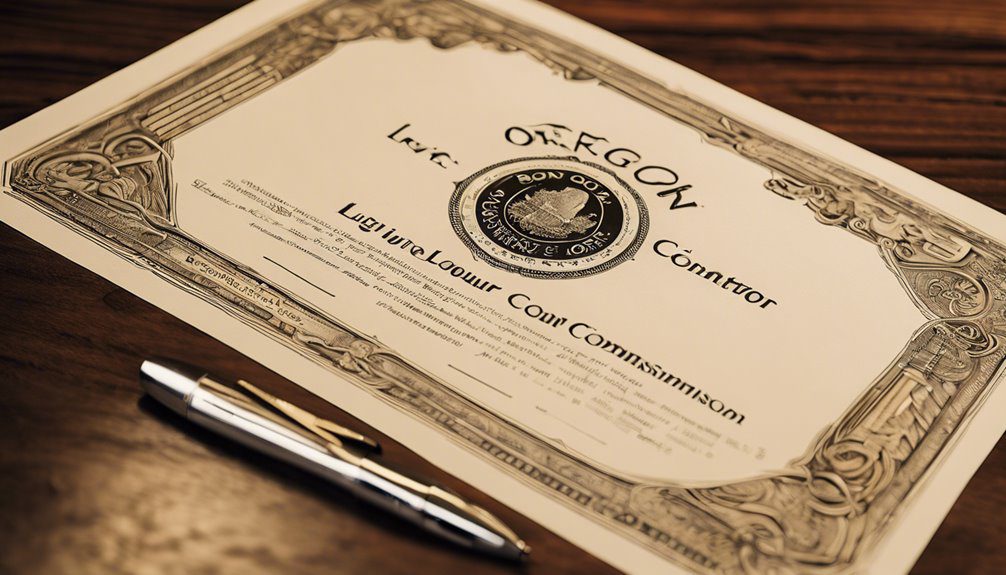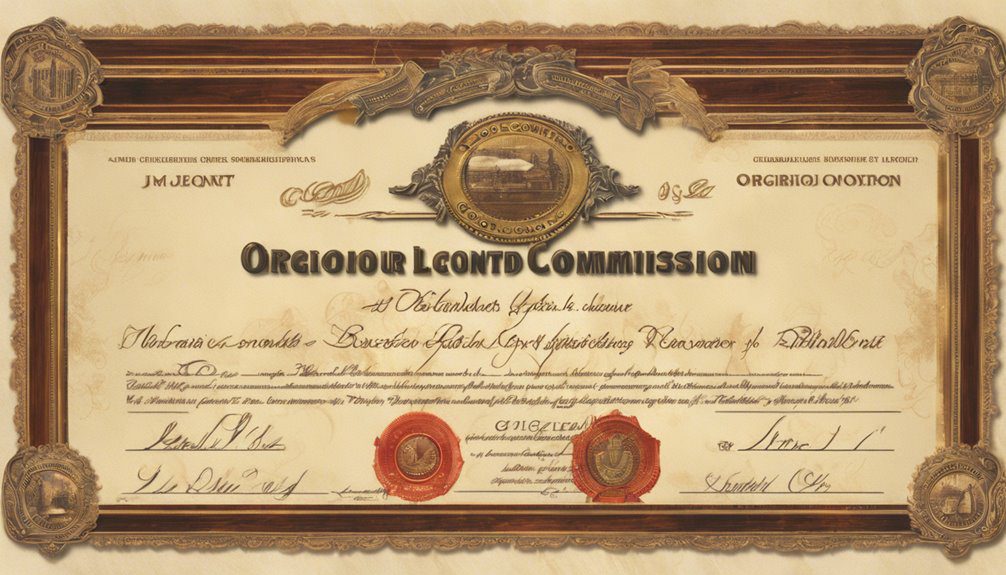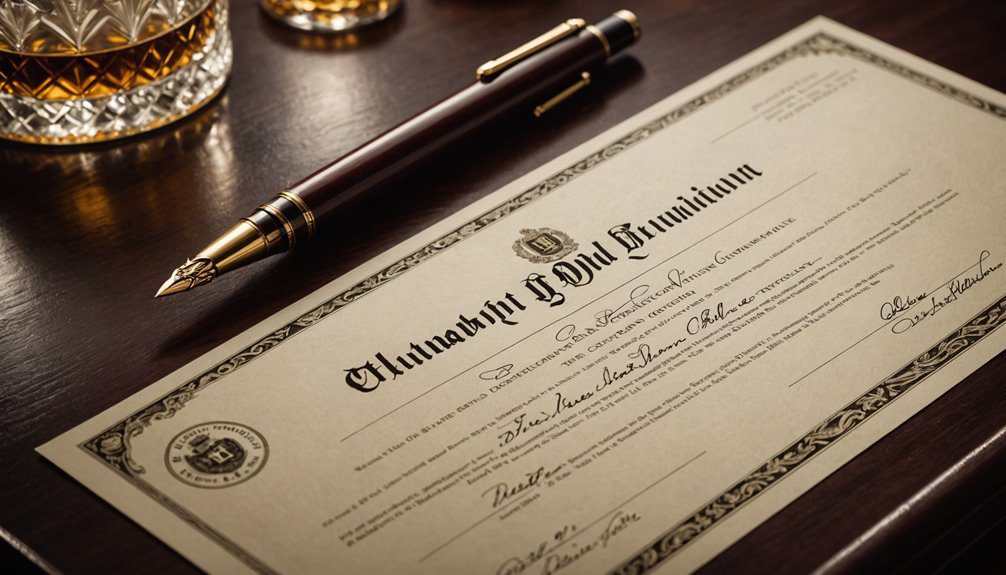If you're considering operating a business that sells alcohol in Oregon, you'll need to understand the Oregon Liquor Control Commission Licensee Bond (Limited on-Premises) Bond. This bond isn't just a formality; it's a vital part of your legal obligations that helps ensure compliance with state laws. It also plays a significant role in establishing your business's credibility. But, you might wonder how this bond affects your operations and what it takes to secure one. The details can be more complex than you think, and the implications for your business are worth exploring.
Overview of the Licensee Bond

What exactly is an Oregon Liquor Control Commission Licensee Bond? This bond is a legal requirement for individuals or businesses seeking to obtain a license to sell alcoholic beverages in Oregon.
Essentially, it serves as a financial guarantee that you'll comply with state laws and regulations governing the sale of alcohol. If you fail to adhere to these rules, the bond protects the state and the public by providing a source of funds to cover any potential claims or damages.
When you apply for a liquor license, you'll need to secure this bond to demonstrate your commitment to responsible business practices.
The bond amount varies based on the type of license you're seeking, and it's often set by the Oregon Liquor Control Commission (OLCC). By obtaining this bond, you're not just fulfilling a legal obligation; you're also showing your dedication to operating a trustworthy establishment.
Purpose of the Bond
The purpose of the Oregon Liquor Control Commission Licensee Bond goes beyond just meeting a legal requirement. This bond serves as a financial safety net for both the state and the public. When you obtain this bond, you're essentially guaranteeing compliance with Oregon's liquor laws and regulations. This shows your commitment to responsible business practices.
If you fail to adhere to these regulations, the bond provides a source of compensation for any damages or violations. This means that if someone suffers a loss due to your actions, they can seek restitution from the bond, rather than relying solely on your personal assets. It enhances trust between you, the state, and your customers.
Moreover, having this bond can improve your business credibility. It signals to your customers and partners that you take your responsibilities seriously and are financially prepared to address any potential issues. In a competitive market, this can give you an edge. Additionally, understanding your state's bond requirements is crucial for maintaining compliance and ensuring smooth operations.
Ultimately, the Oregon Liquor Control Commission Licensee Bond helps ensure a fair and responsible marketplace, benefiting everyone involved in the liquor industry.
Eligibility Requirements

To qualify for the Oregon Liquor Control Commission Licensee Bond, you must meet specific eligibility requirements designed to ensure responsible operations within the liquor industry.
First, you need to hold a valid liquor license issued by the Oregon Liquor Control Commission. This license must be active and in good standing, reflecting your commitment to following state regulations.
You should also demonstrate that you have no significant legal issues related to alcohol sales or distribution. A clean record is essential, as any past violations can hinder your eligibility.
Additionally, you must provide proof of financial stability. This might include submitting financial statements or tax returns, showing you can cover potential liabilities associated with your liquor license.
Application Process
Navigating the application process for the Oregon Liquor Control Commission Licensee Bond involves several clear steps.
First, you'll need to gather all necessary documentation, including your business license and any relevant identification. Make sure your paperwork is complete and accurate, as this can speed up the process.
Next, you'll need to choose a surety company that's authorized to issue the bond. It's essential to shop around for the best rates and terms, so take your time to compare options.
Once you've selected a surety provider, you'll fill out their application form. This typically requires information about your business and financial history.
After submitting your application, the surety company will evaluate your qualifications. They may ask for additional information or clarification during this time.
If everything checks out, you'll receive a bond quote. Review the terms carefully before agreeing.
Once you've accepted the quote, you'll pay the premium to get the bond issued.
Bond Amount and Costs

Understanding the bond amount and associated costs is crucial for anyone applying for the Oregon Liquor Control Commission Licensee Bond. The bond amount typically required for this license is $10,000. This amount acts as a financial guarantee that you'll comply with state regulations regarding the sale of alcohol.
When it comes to costs, the premium you pay for the bond can vary based on factors like your credit score and the surety company you choose. Generally, you can expect to pay between 1% to 15% of the total bond amount annually. For example, if you're quoted a 3% premium, you'd pay around $300 for the first year.
Moreover, additional fees may apply, including application fees or costs related to underwriting. It's essential to get quotes from several surety companies to find the best rate. Additionally, understanding the purpose of surety bonds can help clarify the importance of maintaining compliance with licensing requirements.
Compliance and Regulations
Ensuring compliance with regulations is vital for maintaining your Oregon Liquor Control Commission License.
You'll need to familiarize yourself with the specific laws and guidelines that govern the sale of alcoholic beverages in Oregon. This includes understanding the rules around hours of operation, age restrictions for both customers and employees, and proper serving techniques.
You should also keep accurate records of all transactions and inventory to demonstrate compliance during inspections.
Regularly training your staff on these regulations isn't just a good practice; it's essential for avoiding potential fines or license suspensions.
Additionally, you must be aware of any changes in legislation.
The liquor control landscape can shift, so subscribing to updates from the Oregon Liquor Control Commission or attending industry workshops can be beneficial.
Impact on Business Operations

The success of your business hinges on how well you adhere to the Oregon Liquor Control Commission regulations. Failing to comply can lead to significant consequences, including fines, license suspension, or even revocation. This not only impacts your current operations but can also harm your reputation in the community.
When you maintain compliance, you create a stable environment where your business can thrive. Customers feel more secure knowing that you operate within the law, leading to increased trust and loyalty. Moreover, a good standing with the Commission can enhance your brand image and attract new clients.
Investing time and resources into understanding these regulations is crucial. You should regularly train your staff to ensure everyone knows their responsibilities and the importance of compliance. Keeping up-to-date with any changes in the law will also help you avoid potential pitfalls.
Ultimately, the Oregon Liquor Control Commission Licensee Bond acts as a safety net. It shows you're committed to following the rules, which can positively influence your overall operations.
Conclusion
In summary, the Oregon Liquor Control Commission Licensee Bond is essential for your business if you're selling alcohol in the state. It not only ensures compliance with liquor laws but also boosts your credibility and competitiveness. By understanding the bond's purpose, eligibility requirements, and application process, you can navigate the requirements more easily. Securing this bond ultimately helps protect your business and the community, so don't overlook its importance in your operations.


